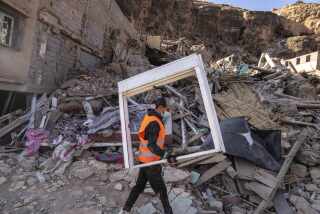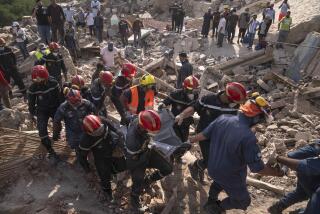3 Moroccans Charged in Madrid Blasts; Police Find Ties to Al Qaeda
- Share via
MADRID — An investigative magistrate Friday accused three Moroccans, including a top suspect in train bombings here last week, of multiple counts of murder, attempted murder and terrorist activity in the attacks that killed 202 people and wounded 1,500.
After seven hours of closed testimony, Judge Juan del Olmo ordered Jamal Zougam, his half-brother Mohamed Chaoui and their business partner Mohammed Bekkali held on suspicion of the bombing-related charges as well as auto theft, Spanish authorities said.
Investigators believe that Zougam, 30, played a central role in a plot that teamed longtime extremists based in Spain with Moroccan operatives who arrived more recently. The March 11 bombings had a resounding effect worldwide, contributing to the electoral defeat of Spain’s ruling party, weakening the U.S.-led coalition in Iraq and raising fears of new Islamic terrorist strikes.
Investigators say they have found ties between Zougam and important Al Qaeda operatives and ideologues dating back more than three years. But police never had enough evidence to arrest him, they say, even after his name surfaced in connection with last year’s suicide bombings against Spanish and other Western targets in Casablanca, Morocco.
During an early morning interrogation Friday, Zougam denied any role in the Madrid bombings, court officials said. He kept his gaze fixed on the floor and broke down in tears, the officials said.
All three Moroccans insisted that they were asleep at home at the time of the train explosions, which took place about 7:45 a.m., court officials said. Although Chaoui supported his half-brother’s alibi, saying they were asleep in the same room, he also testified that they were not close because Zougam was “very religious,” court officials said.
A witness has claimed that Zougam was aboard one of the trains, but police are unsure about that account. The strongest evidence against Zougam centers on phone equipment he allegedly had supplied that was used as remote detonators for the bombs, a senior law enforcement official said.
Before his hearing, Zougam prayed for hours in a cell at Audiencia Nacional, a courthouse that hears cases of terrorism, officials said. The three Moroccans face 190 counts of murder, a number that differs from the death toll because some bodies remain unidentified.
The judge also jailed two Indian immigrants, Suresh Kamar and Vinay Khohy, on suspicion of terrorist collaboration and fraud for their connections to fraudulent phone cards used in the detonators.
The five were jailed pending prosecution as police interrogated five new suspects who were arrested this week, including a Moroccan associate of Zougam named Mohammed Chedadi, 38. Moroccan government spokesman Nabil Benabdela, speaking to state media, identified two others as Abderrahim Zbakh, 33, and Farid Oulad Ali, 34.
Like Zougam, Chedadi is a shopkeeper born in Tangier and was already known to anti-terrorism investigators. Police arrested his brother, Said Chedadi, in late 2001 in a crackdown on an Al Qaeda cell here suspected of involvement in the Sept. 11 attacks on the United States.
The focus on the Chedadis underscores possible links between the attacks in Madrid and Casablanca, both of which may have involved the Moroccan Islamic Combatant Group, an offshoot of the Al Qaeda terrorist network. Said Chedadi was a close associate of two veteran Moroccan jihadis imprisoned in connection with the Casablanca attacks.
Said Chedadi allegedly served as a courier to London, bringing money and messages to Abu Qatada, believed to be Al Qaeda’s leader in Europe, according to court documents. That connection took on potential importance Friday when Scotland Yard chief John Stevens told a British newspaper that there was a “definite link” between London and the Madrid bombings, British officials said.
Zougam is believed to have had contacts with Islamic fundamentalists in Britain, investigators say.
Mohammed Chedadi was arrested in Lavapies, a boisterous historic neighborhood in Madrid mixing elderly Spaniards with Moroccan, Latin American and East Indian immigrants. Since his brother’s arrest three years ago, Chedadi had operated their tiny store on a one-lane side street lined with import-export stores, fellow immigrants said. They described him as tall, robustly built and a hard worker who also did construction jobs.
“He opened from 9 or 9:30 and stayed open until 8 at night,” said a man who identified himself only as Laya, during a conversation in the Al Baraka restaurant around the corner from the Chedadis’ shop. He said Chedadi did a thriving trade in fake brand-name shirts and jeans. “Police came often to the shop -- many, many times. They came to seize clothes. Police knew the place well.”
Anti-terrorist police also knew the Chedadis’ place, which is only two blocks from the store where Zougam sold the telephone equipment at the heart of the investigation.
One of the other suspects, not yet formally identified, is a Spaniard who is believed to have obtained the explosives at a mining business in northwestern Spain.
Times special correspondents Bruce Wallace and Cristina Mateo-Yanguas contributed to this report.
More to Read
Sign up for Essential California
The most important California stories and recommendations in your inbox every morning.
You may occasionally receive promotional content from the Los Angeles Times.













